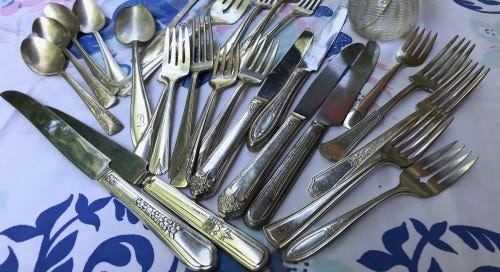I had a barbecue sandwich last weekend that was moist, smoky-sweet, and clearly not under the vinegary influence of eastern North Carolina. Nevertheless, I was down east, in Columbia–a small village on the banks of the Scuppernong River, about 45 minutes west of Manteo. Columbia is home to the Pocosin Arts School of Fine Craft, where pottery, painting, and metalsmithing are among the classes offered in their waterside studios. Check it out.
The new/old silverware. Photo by Donna Campbell.
But back to the barbecue. The generously portioned sandwiches–pork or beef brisket–came with a smattering of slaw and were still warm. Turns out they came from a backyard smoker at the Captain’s Quarters Inn, a bed and breakfast just across the Albemarle Sound in Edenton. Don and Diane Pariseau have run the B&B for 15 years. They moved to North Carolina from California, where they owned a restaurant in Napa for more than two decades, serving Diane’s creations. “California French style, we called it,” Don said, when I called him this week. Originally from Massachusetts, the Pariseaus left California and moved east to be closer to their relatives in New England. “But not that close,” Don added and laughed. “It’s too cold up there.”
If you’ve never been to Edenton, it’s a worthy destination with important North Carolina history, including the home of writer Harriet Jacobs, born into slavery in 1813 and whose autobiography, Incidents in the Life of A Slave Girl, tells of her hardships under a master who abused her as a child and later threatened her children. Jacobs would eventually escape to New England after hiding in her grandmother’s Edenton attic for seven years. She became a vocal proponent of abolition, and her book was one of the first published by an African American woman in the era. As the first colonial capital of North Carolina, Edenton is filled with graceful architecture and is also home to the oldest courthouse in the state.
So, how did Midwestern barbecue end up as a mainstay in this old Carolina town on the water?
Looking for ways to build up the B&B business, Don Pariseau came up with “Rib University” in 2011. (He has long been a judge for the Kansas City Barbecue Society competitions.) At the high point of Rib U., Don was teaching 260 classes a year. Now he offers his workshop at the Inn on the third Wednesday and Thursday of the month, April through October.
Wednesday night the class begins with a BBQ sauce tasting. The next morning after breakfast, Don discusses different types of smokers, charcoal, and smoking woods, and how to control the temperature of the cooker.
After lighting the smoker, the class samples four different rubs and learns how to break down a slab of ribs and prepare them for the fire. Don cuts his ribs St. Louis style, which means rectangular and flat with the cartilage and breastbone removed. As the spareribs cook all day, participants explore Edenton.
Thursday evening the class reconvenes to sample the various rubs on the ribs, along with sides of slaw, beans, and cornbread. The class is $85 per couple in addition to two nights’ lodging at the Captain’s Quarters.
Edenton locals also know there’s a good chance that Don will be smoking meat most weekends, too. They either smell the smoke or get the word on facebook, and the line forms across his backyard for sandwiches before lunchtime. Such was the origin of the sandwich I had at Pocosin.
On Saturday nights at the B&B, Chef Diane also prepares a prix fixe meal for Inn guests, though sometimes there may be a few extra seats at the table. (Call for reservations.) Don says the first course is generally local seafood, and the rest of the meal will feature in-season items from local farmers or the Pariseau’s own garden outside of town. Recently, Diane served locally-raised quail. Don will also take special orders for the cue. He prepared 15 pounds of brisket for a wedding along with 80 sandwiches last weekend.
But here’s the rub. As most folks know, running a B&B is no vacation. It is hard work, and the Captain’s Quarters Inn is now on the real estate market. Sadly, as I have learned in my research for a book on North Carolina heritage foods called The Month of Their Ripening , the restaurant business is as ephemeral as the seasonal foods I describe in each chapter.
Case in point: yesterday I bought eight place settings from the wonderfully eclectic collection of silver plate that Chef Nate Allen once used at Knife and Fork, the revolutionary restaurant in the mountain town of Spruce Pine that closed at the end of March. Nate’s skill in preparing tempura ramps and muddled serviceberries at the bar are both discussed in the book. Now we will have to try to recreate his recipes ourselves. Nate is cooking in the Hamptons this summer.
So if you have a chance to attend Rib University or spend a weekend in Edenton, do it soon and enjoy a little taste of the Midwest in North Carolina’s original capital city.





